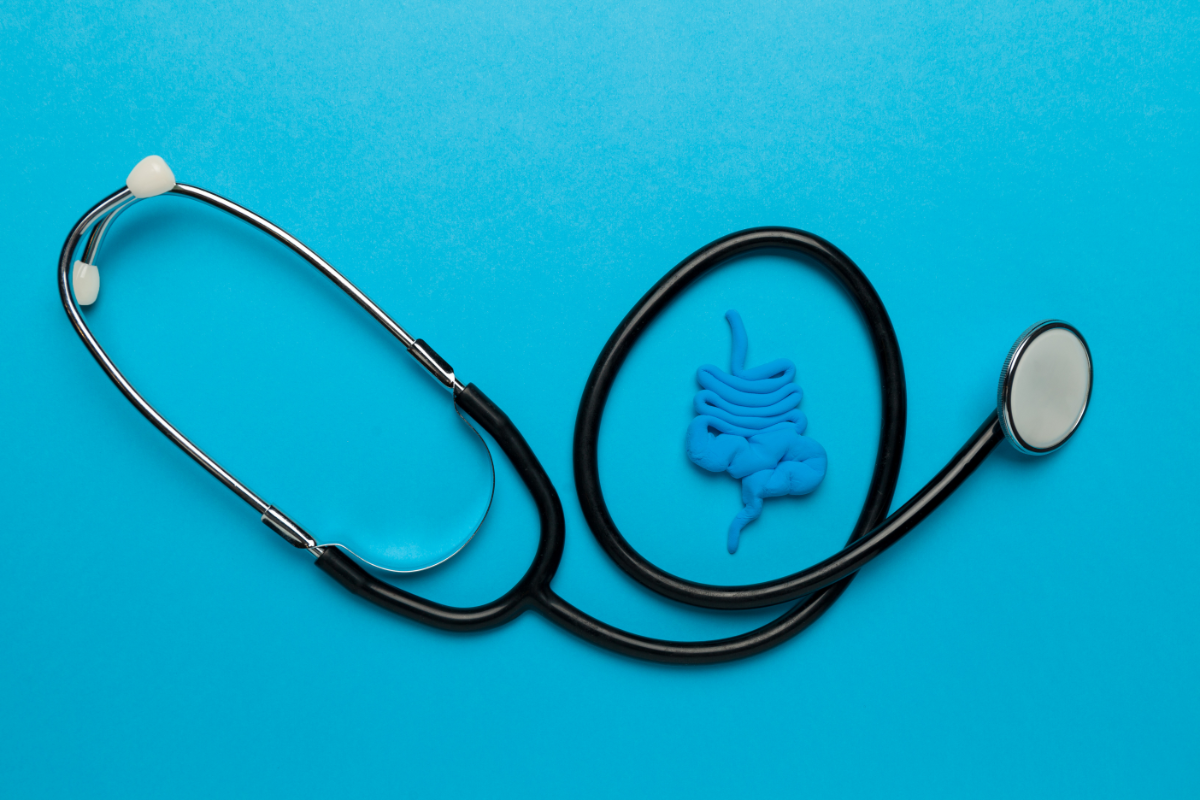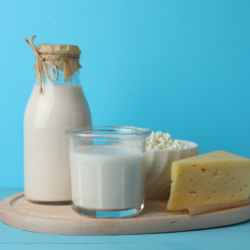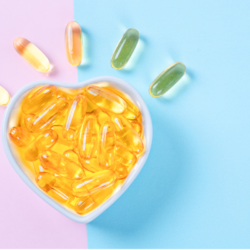Irritable bowel syndrome (IBS) is a common condition affecting many people around the world. Although it can be difficult to manage, understanding the importance of diet and knowing what foods to eat or avoid can make a big difference to the quality of life of sufferers.
Understanding IBS
Research into the link between diet and IBS has progressed, and it is now clear that certain foods can contribute to symptoms. Here are some key points to consider:
Definition and symptoms
Irritable bowel syndrome (IBS) is a chronic functional disorder of the gastrointestinal system. It is characterised by a combination of symptoms such as abdominal pain or discomfort, bloating and changes in bowel habits (constipation, diarrhoea or alternating between the two). These symptoms can vary in intensity and frequency and often have a significant impact on quality of life.
Causes and risk factors
The exact causes of IBS remain unknown, but several factors may contribute to its onset:
- Imbalance of intestinal flora: A disturbance in the balance of intestinal bacteria can affect intestinal function.
- Food sensitivities: Certain foods can trigger or aggravate symptoms.
- Psychological factors: Stress, anxiety and depression can play a role in exacerbating symptoms.
- Genetic factors: There is evidence of a genetic predisposition to IBS.
Diagnosis and treatment
Diagnosis of IBS is generally clinical, based on symptoms and exclusion of other digestive disorders. Treatment is often individualised and may include:
- Diet modification: Adapting the diet to suit specific needs.
- Medication: Certain medications may be prescribed to control symptoms.
- Behavioural therapies: Approaches such as cognitive behavioural therapy can help manage the stress associated with IBS.
Foods to encourage
As part of the management of irritable bowel syndrome, there are certain foods that can help relieve symptoms; we’ll look at these in the next section.
Fibre-rich fruit and vegetables
Eating fibre-rich fruit and vegetables can help regulate bowel movements. Examples: carrots, apples, bananas, spinach.
Lean proteins
Sources of lean proteins such as chicken, turkey or fish can be more easily digested.
Adequate hydration
Drinking enough water helps digestion and can reduce constipation.
Foods to avoid
As well as adopting a diet that helps relieve irritable bowel syndrome, it’s crucial to identify and avoid certain foods that can exacerbate symptoms, as we’ll explore in this section.
Dairy products rich in lactose
Lactose can make symptoms worse for some people with IBS. Avoiding or reducing dairy products may be beneficial.
Saturated fats and fried foods
Foods high in saturated fat and fried foods can increase IBS symptoms.
Gluten and gluten-containing cereals
Gluten can contribute to IBS symptoms in some people. Avoiding or reducing consumption of gluten-containing products can be a useful strategy.
Different diets for IBS
Managing irritable bowel syndrome (IBS) may require a specific, individualised nutritional approach. Certain diets have been shown to be effective in relieving IBS symptoms. Here’s an exploration of these diets, as well as complementary techniques for managing IBS.
The FODMAP diet
The FODMAP diet is based on temporary restriction of certain fermentable carbohydrates which can cause digestive symptoms in people with IBS. The process involves three phases:
- Elimination: Elimination of foods rich in FODMAPs for 6 to 8 weeks.
- Reintroduction: Gradual reintroduction of foods to identify triggers.
- Personalisation: Adapting the diet to individual needs.
This diet should be followed with the help of a healthcare professional to ensure a balanced nutritional intake.
Gluten-free diet
Some people with IBS may be sensitive to gluten. A gluten-free diet consists of eliminating foods containing this protein, such as wheat, barley and rye. Symptoms may improve, but medical supervision is recommended to avoid dietary deficiencies.
Fibre-rich diet
Dietary fibre can help regulate intestinal transit. A high-fibre diet can include an increase in fruit, vegetables and wholegrain cereals. It is important to note that the type of fibre (soluble or insoluble) can have different effects, so a balanced approach is essential.
Managing stress and IBS
Stress management is a key component of managing IBS, as stress can make symptoms worse. Here are some complementary techniques:
Relaxation techniques
Methods such as progressive muscle relaxation or deep breathing can help reduce stress and improve IBS symptoms.
Complementary therapies such as meditation
Meditation and mindfulness can be powerful tools in managing IBS. They create a mind-body connection, helping to better understand and manage symptoms.
Managing irritable bowel syndrome (IBS) goes beyond food selection and also includes considerations about how meals are eaten. Here are some specific recommendations to help reduce IBS symptoms during meals:
Frequent small meals
One dietary strategy that can benefit people with IBS is to break up their meals into smaller, more frequent portions throughout the day. This approach can help to :
- Reduce digestive burden: Eating large quantities at a time can overload the digestive system, exacerbating IBS symptoms. Smaller meals can make digestion easier.
- Maintain a stable energy intake: Frequent eating helps maintain a constant energy level, without the fluctuations that can occur after a large meal.
- Personalise your diet: This method allows greater flexibility in food choice, which can make it easier to adapt to a specific diet for IBS.
Avoid fizzy drinks
Carbonated drinks, including soft drinks and certain mineral waters, can introduce gas into the digestive system. For people with IBS, this can lead to or worsen symptoms such as bloating and abdominal pain. We therefore recommend :
- Opt for non-carbonated drinks: Alternatives can include still water, herbal teas or acid-free juices.
- Read labels: Some products may contain added gases, so it’s worth checking labels when you buy.
Reduce your caffeine intake
Caffeine, found in coffee, tea and some energy drinks, can stimulate the digestive system and worsen IBS symptoms. Recommendations include:
- Reduce gradually: A sudden reduction in caffeine can cause withdrawal symptoms. It is therefore preferable to reduce gradually.
- Choose alternatives: Opting for caffeine-free or low-caffeine drinks can help control symptoms without completely eliminating these popular beverages.
Which supplements should I choose to relieve IBS?
When exploring the problem of irritable bowel syndrome, it’s essential to look at the various approaches to alleviating symptoms, which can differ considerably from one individual to another. Among the avenues to be considered, food supplements are emerging as increasingly relevant players in the management of this condition. In a non-promotional way, we can highlight a few products that have stood out for their effectiveness and their ability to improve digestive comfort.
Aboca Colilen – A Balanced Solution for Irritable Bowel Syndrome
Irritable bowel syndrome, with its fluctuating and sometimes disturbing symptoms ranging from chronic abdominal pain to transit disturbances, is attracting real attention. Aboca’s Colilen IBS is emerging as an innovative approach to tackling this complex problem. It works in harmony with the body, offering a global solution for treating the syndrome. By focusing on the variability of symptoms specific to each individual, Colilen IBS offers a personalised solution for each case. The 96 capsules contained in each pack aim to provide long-lasting, discreet relief, in perfect correlation with the changing dynamics of the syndrome.
Glutaform Synergia – Supporting intestinal health from the inside out
For those considering a holistic approach to relieving irritable bowel syndrome, Glutaform Synergia is positioned as a solution combining digestive comfort and immune reinforcement. In its 20 sachets, this dietary supplement stands out for its ability to act on intestinal hyperpermeability, often linked to this syndrome. L-glutamine, a key element, plays an essential role in regenerating the intestinal wall, thereby promoting intestinal health and integrity. Glutaform Synergia embodies a proactive approach to pampering the gut from the inside out, discreetly and sympathetically.
Lactiplus Butyrate LP – Nourishing Intestinal Balance with Prevention
In the quest for optimal intestinal balance, butyrate plays a key role. Lactiplus Butyrate LP comes in 30 orodispersible sachets, offering a practical, targeted option for promoting intestinal health. Using a subtle approach, this dietary supplement aims to nourish the intestine by providing butyrate, a compound beneficial for regulating intestinal function. Lactiplus Butyrate LP offers a gentle way to support the gut in its quest for balance, without compromise.
FAQs
- What are the symptoms of IBS? Symptoms include abdominal pain, bloating and changes in bowel habits.
- Does the FODMAP diet work for everyone? The FODMAP diet can be beneficial, but it is not suitable for everyone. It is advisable to consult a healthcare professional.
- Can probiotics help? Probiotics can help some people, but their effectiveness varies.
- Can IBS be cured? There is no cure, but symptoms can be managed with the right diet and treatment.
- Can children get IBS? Yes, children can get IBS, although the diagnosis and treatment may be different.
- How does stress affect IBS? Stress can make symptoms worse, and stress management can be an important part of treatment.







